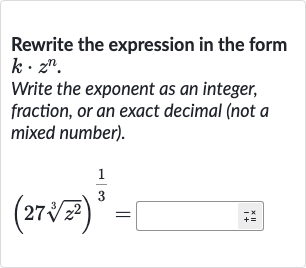AI tutor
Welcome to Bytelearn!
Let’s check out your problem:

Rewrite the expression in the form .Write the exponent as an integer, fraction, or an exact decimal (not a mixed number).
Full solution
Q. Rewrite the expression in the form .Write the exponent as an integer, fraction, or an exact decimal (not a mixed number).
- Identify components: Understand the given expression and identify the components.The given expression is . We need to rewrite this expression in the form , where is a constant and is the exponent.
- Rewrite as exponent: Rewrite the cube root in the expression as an exponent.The cube root of a number can be written as that number raised to the power of . So, can be written as .
- Simplify cube root of : Simplify the expression for the cube root of . Since is , the cube root of is . So, simplifies to .
- Simplify exponent for : Simplify the exponent for . The exponent for is , which simplifies to . So, simplifies to .
- Apply outer exponent: Apply the outer exponent to the simplified expression.Now we have . When we raise a product to an exponent, we raise each factor to that exponent: .
- Simplify raised to : Simplify the expression for raised to the power of . Since raised to the power of is the cube root of , which is just , this part of the expression remains .
- Simplify exponent for : Simplify the exponent for . When we raise an exponent to another exponent, we multiply the exponents. So, simplifies to , which is .
- Combine constants and exponent: Combine the constants and the simplified exponent for . The final expression is .
